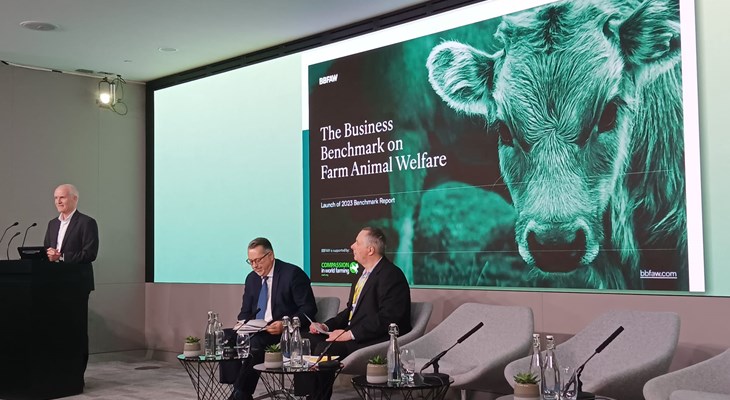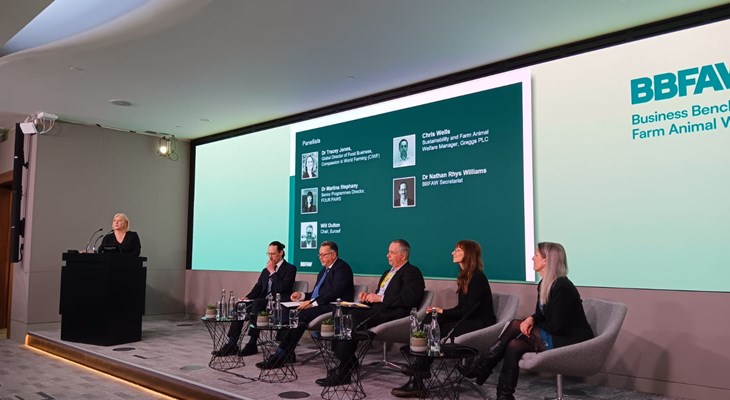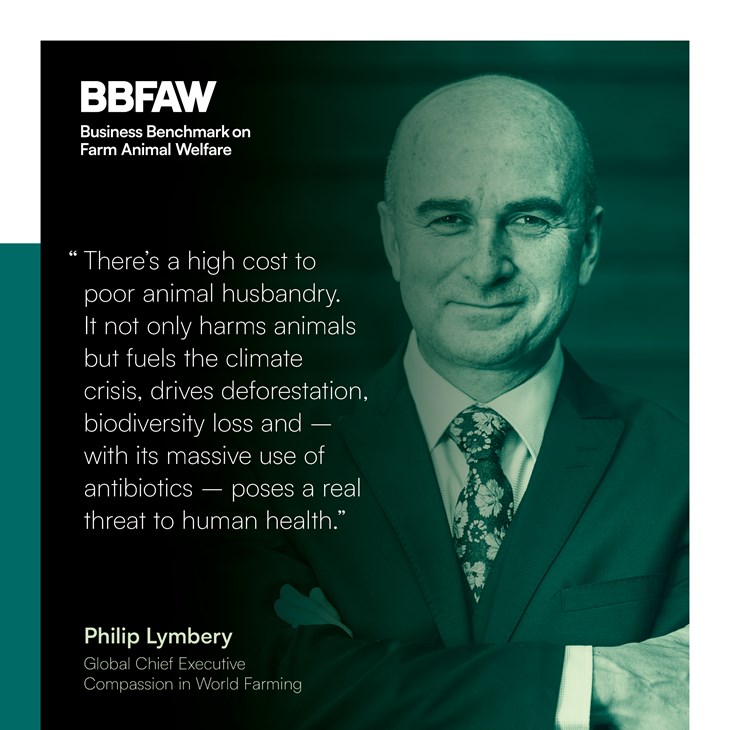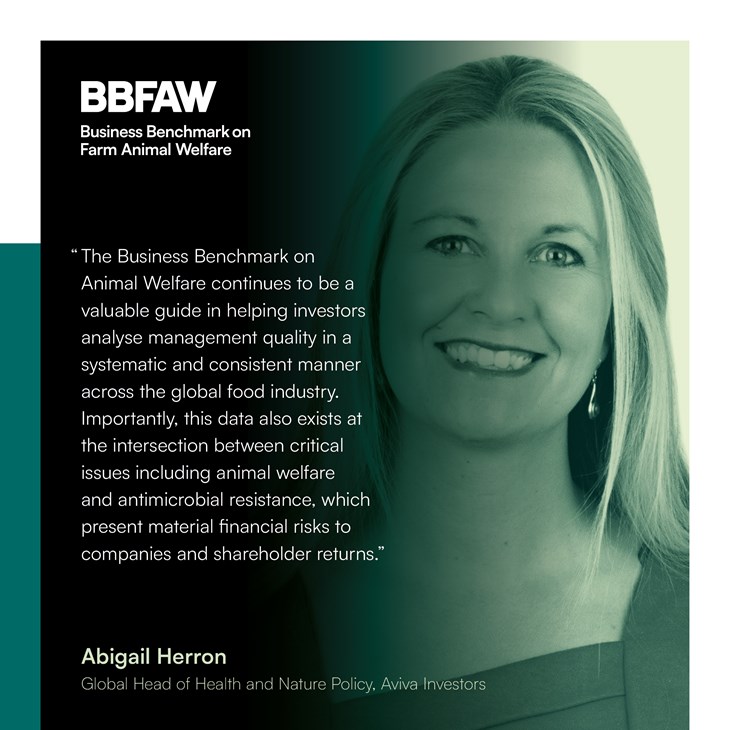Today sees the relaunch of the latest Business Benchmark on Animal Welfare (BBFAW), which introduces a new baseline for animal welfare improvement for the 150 global companies assessed.

The event was held at the London Stock Exchange and featured the following speakers:
- Dr Rory Sullivan, CEO Chronos Sustainability
- Nicky Amos, Managing Director, Chronos Sustainability
- Will Outen, Chair of the Board, Eurosif
- Chris Wells, Sustainability and Farm Animal Welfare Manager, Greggs
- Philip Lymbery, CEO, Compassion in World Farming
- Dr Martina Stephanie, Senior Programmes Director, FOUR PAWS
During his presentation, Chris Wells from Greggs said:
“Farm animal welfare is and will remain a top priority…..changes take time and investment but they are the right thing to do.”
Nicky Amos also moderated a panel session that convened representatives from Chronos Sustainability, Eurosif, Greggs, and BBFAW partners FOUR PAWS, and Compassion in World Farming.

Dr Rory Sullivan concluded the event by encouraging companies to continue to progress with their commitments:
“Change is driven by visionary people who want to work together and make a difference.”
BBFAW 2023 Results
A total of 150 global food producers, retailers and food-service companies with combined revenues of more than US$4.9 trillion, including the likes of McDonalds, Tesco and Tyson Foods, were ranked by BBFAW.
The latest report reveals that 95% of global food companies now recognise ‘farm animal welfare’ as a core business issue (up from 79% in 2012), with Marks & Spencer, Premier Foods and Waitrose as the highest-ranked companies.
This year, the Benchmark introduced tougher assessment criteria and an increased focus on ‘Performance Impact’ - measuring how well companies are delivering on their welfare commitments. It also included a new section on how companies are recognising the need to reduce reliance on animal sourced foods and diversify into alternative proteins.
The highest scoring companies on ‘Performance Impact’ achieving a ‘C’ rating included: Marks & Spencer (UK), Groupe Danone (FR), Premier Foods (UK), Waitrose (UK), Cranswick PLC (UK) and Migros-Genossenschafts-Bund (Switzerland). However, implementation lags commitment with 93% of companies rated as ‘E’ or ‘F’ on ‘Performance Impact’, and no firm achieved the top ‘A’ or ‘B’ ranking.
Encouraging signs
This year’s benchmark found several encouraging signs as it set a new baseline for corporate performance, including:
- 95% of companies assessed identify farm animal welfare as a relevant business issue, up from 79% in 2012.
- 3 companies (Marks & Spencer, Premier Foods, Waitrose) achieved ‘Tier 2’ status, therefore demonstrating leadership in making farm animal welfare integral to their business strategy.
- 6 companies achieved a ‘C’ rating on ‘Performance Impact’: Marks & Spencer (UK), Groupe Danone (FR), Premier Foods (UK), Waitrose (UK), Cranswick PLC (UK) and Migros-Genossenschafts-Bund (Switzerland).
- There are generally high levels of ambition on cage-free eggs, with 73% of the 141 companies that have eggs in their supply chains now having cage-free egg commitments.
- 25% of companies recognise the need to reduce reliance on animal sourced foods and diversify into alternative proteins as a relevant business issue, with 21 companies including Greggs, Sodexo and Carrefour publishing time-bound targets.
More to be done
Many findings in this year’s benchmark also showed the work that still needs to be done by the food sector:
- Implementation lags commitment: 93% of companies rated as ‘E’ or ‘F’ on ‘Performance Impact’, and no company achieved the top ‘A’ or ‘B’ rating.
- No policy: 19 global food companies, including Yum China Holdings (owners of KFC in China) and Domino’s Pizza Inc (US), have yet to even publish a formal farm animal welfare policy.
- Close confinement:
- 18% of companies, including Tyson Foods and WH Group (which includes large US pork producer Smithfield) have no policy commitment to end the use of close confinement.
- Only 9% of companies with pigs in their supply chain (13 of 137 companies) have set credible targets to end the use of ‘sow stalls’ or ‘farrowing/gestation crates’.
- Routine mutilation - A majority of companies (52%) have no policy to manage routine mutilations - such as branding with hot irons or tail docking in pigs and cattle.
- Live transport: Only 27% of assessed companies report that live transportation of farm animals is restricted to short journeys only (i.e. 4 hours or less for poultry and rabbits, and 8 hours for other species).
- Antibiotics: Only 40% of companies have commitments in place to end prophylactic and routine metaphylactic antibiotic use – despite the risk of surging antibiotic resistance.

Philip Lymbery, Global Chief Executive, Compassion in World Farming, said: “There’s a high cost to poor animal husbandry. It not only harms animals but fuels the climate crisis, drives deforestation, biodiversity loss and - with its massive use of antibiotics - poses a real threat to human health. The Business Benchmark for Farm Animal Welfare continues to play a critical role in driving higher standards in the world’s leading food businesses, showing the benefits of this approach, and providing a vital yardstick to inform investor choices.”
BBFAW Partners
BBFAW was originally launched in 2012 and remains the leading global assessment of companies’ farm animal welfare policies and practices. It is supported by partners Compassion in World Farming and FOUR PAWS and by a coalition of institutional investors, managing over $2.3 trillion in assets who will engage with the companies in the year ahead to drive improvement.

Read the findings of the 2023 BBFAW report.